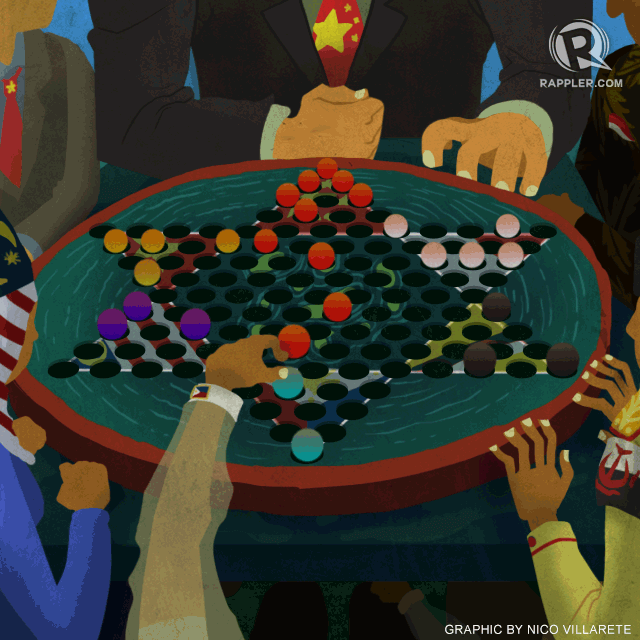SUMMARY
This is AI generated summarization, which may have errors. For context, always refer to the full article.

On July 7 to 13, the Philippines argues its historic case versus China before a UN Arbitral Tribunal in The Hague. The core issue to be resolved is: does the Arbitral Tribunal have jurisdiction over the maritime dispute?
In the hearing, a top-level delegation will represent the Philippines. Foreign Affairs Secretary Albert del Rosario and Solicitor General Florin Hilbay will read prepared statements while counsels, led by Paul Reichler, will undertake the oral arguments. Reichler, of the US law firm Foley Hoag, has a long experience in international arbitration, taking countries like the US and UK to court.
Supreme Court Justice Antonio Carpio, who has extensively studied and lectured on the historical roots and legal dimensions of the South China Sea dispute, will join the team as resource person.
But the hearing will be unusual. The seats meant for China will be empty and silence will meet the presentation of the Philippines. For China is acting belligerently, refusing to participate in the proceedings.
It’s been more than 2 years since the Philippines hauled China to an international arbitration court, a first for the emerging global power. The Philippines’ main claim is that the nine-dash line of China, which swallows a vast expanse of our Exclusive Economic Zone, violates international law as set forth in the UN Convention on the Law of the Sea (UNCLOS), of which China is a signatory.
What China did was to file a “position paper” objecting to the tribunal’s jurisdiction. In response, the 5-member tribunal, headed by Judge Thomas Mensah, 81, a seasoned maritime expert, will decide on the jurisdictional issue first before going into the merits of the case.
Reichler said in an interview with the Wall Street Journal that since no one will speak for China, the judges will have to do everything within their means, including hiring technical experts and accessing maps, to “satisfy themselves that the Philippines’ claims are well-grounded in fact and law.”
Carpio is optimistic that the tribunal will affirm its jurisdiction. He said in a lecture that UNCLOS would be ruined if the tribunal decides it does not have jurisdiction on the case, a severe blow to the rule of law, a solid foundation of international relations.
Among the Southeast Asian countries with claims to the South China Sea, only Vietnam has come to the aid of the Philippines. In a position paper it submitted to the tribunal, Vietnam said it rejects China’s claims over the disputed waters.
Should the tribunal say that it has jurisdiction over the case, the Philippines sees a smooth flow of hearings the rest of the year and expects a decision early 2016. The big question, though, is: will China abide by a decision favorable to the Philippines?
China, resting on its economic and military might, can ignore the ruling. But Reichler sees international pressure bearing on the giant nation. “It’s a very high cost to prestige to be branded as an international wrongdoer and then not comply,” he told Foreign Policy. “China has always denounced imperialism, denounced unilateralism, has denounced violations of the U.N. Charter. This is an opportunity for China to really show its true colors.”
In more than 95% of international cases, Reichler said, states comply with the judgment even if they are the losing parties.
Meanwhile, China has gone on a reclamation binge, building runways and structures on contested areas. The Chinese Coast Guard has also occupied parts of our maritime zone.
All the Philippines can do, at this point, is defend and protect our 9 islands and features that have not been occupied by China, including Pag-asa, the biggest island, and Ayungin Shoal, where our ramshackle BRP Sierra Madre stands guard.
In the long term, a robust economy, with resources for a strengthened armed forces, and a mature nation where the twin insurgencies belong to history, will boost the country’s response to China. The military can focus on external threats and the people can be more confident in heeding Deng Xiaoping’s advice. As the former leader of China said in 1974 at the UN General Assembly:
“If one day China should change her color and turn into a superpower,
if she too should play the tyrant in the world, and everywhere subject
others to her bullying, aggression and exploitation, the people of the
world should identify her as social-imperialism, expose it, oppose it, and
work together with the Chinese people to overthrow it.”
Forty years later, China is what Deng Xiaoping said it would be. “China’s strategy is to ultimately effect control of the South China Sea preferably without firing a shot,” said former national security adviser Jose Almonte, “and will do it because it can.”
This week’s hearings in The Hague – and the rest that will follow – are a battle cry for the rule of law and deserve all the Filipinos’ attention and support. – Rappler.com
Add a comment
How does this make you feel?
There are no comments yet. Add your comment to start the conversation.